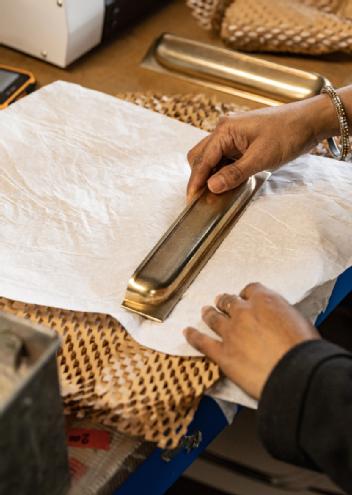Success Story Assetbank
Armac Martin reignite sustainability drive with second collaborative project
“Working with WMG again has been really beneficial for us. This project will enable us to lower our carbon emissions, something critical for us from both a CSR perspective and in combating rising energy costs to remain competitive.”
Steven West, Head of Operations, Armac Martin Ltd
Background
In 2021, following the introduction of the UK Government’s Net Zero strategy, luxury brass hardware manufacturer, Armac Martin was one of the first companies to join WMG’s Net Zero Innovation (NZIN) Progamme. They collaborated with us to implement sustainable packaging for key product lines in their business. After exploring recyclable, compostable, and returnable options, a cost effective and biodegradable paper-based material was selected which reduced packing time significantly, leading to productivity gains in the business.
Challenge
With renewed drive to reduce emissions by 50% by 2025 and reach Net Zero by 2041, Armac Martin wanted to work with WMG again to see where they could best focus their attentions to achieve these goals. They joined the NZIN programme on a second cohort alongside Brandauer, Sarginsons, Modpods and McGeoch.

Solution
WMG examined how the company could reduce emissions across Scope 1,2 and 3[i] in the business, through a Greenhouse Gas Accounting project. We highlighted a range of opportunities for them to take onboard as part of a five-year roadmap for sustainable change aligned with business visions and priorities through a NZIN roadmap. Representatives from the company also participated in several workshops hosted by WMG.
Impacts
· The company now have a clear vision of how they are going to reach their 2025 and 2041 targets with an action plan to reduce energy costs in the business, including using data to optimise energy usage, as well as voltage optimisation, insulation, and variable speed drives of machinery,
· They plan to install Solar PV Panels to reduce energy related emissions and susceptibility to grid price fluctuations
· They have the opportunity to access grant funding to install the Solar Panels of up to £100,000,
· They now have a robust sustainability strategy which they communicate to both internal and external stakeholders.
“Armac Martin are a company committed to sustainability and it was great to work with them on a second project looking at energy usage in the business. They are a shining example of how businesses can work towards Net Zero targets while adding value to their clients’ customer experience.”
Archit Tamboli, Technology Transfer Engineer, WMG, University of Warwick
For more info on Armac Martin’s sustainability strategy visit:
https://www.armacmartin.co.uk/
[i] *Scope 1 emissions are the Green House Gas (GHG) emissions that a company makes directly — for example while running its boilers and vehicles.
Scope 2 emissions are the emissions it makes indirectly – like the electricity or energy it buys for heating and cooling buildings, which is being produced on its behalf.
Scope 3 emissions are all the emissions associated, not with the company itself, but those that the organisation is indirectly responsible for, up and down its value chain. For example, from buying products from its suppliers, and from its products when customers use them.
